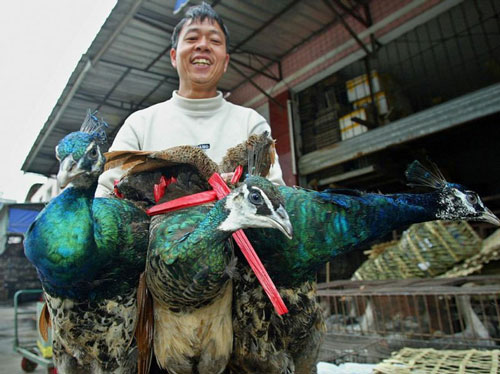Guangzhou
China’s leaders have launched an immediate ban on selling and eating wild animals, in a fast-track decision to fight the spread of the coronavirus.
Within hours of the crackdown being announced by the National People’s Congress – China’s top level of parliament – authorities started closing down markets across the country selling species ranging from badgers, deer and peacocks to turtles, pangolin and civet cats.
The ban marks a major shift in the country’s attitude to selling and eating animals caught from the wild. Most towns and cities in the country have one or more wild animal markets.
Experts say citizens are so worried about the rapid spread of coronavirus that they will help police the ban, by posting on social media photos and information on any traders breaching it.
However, trade in pigeons, rabbits and quail, bred for consumption rather than taken from the wild, is still allowed.
Scientists suspect the coronavirus was spread from wild animals to humans in December in a market in Wuhan after the earliest infections were found in people who had exposure to a wildlife market.
The order says the illegal consumption of or trade in wildlife will be severely punished, as will hunting or transporting wild animals for eating.
Authorities had last month tried to introduce a temporary clampdown on markets where species from bats to snakes and mink are kept in cramped cages to be slaughtered on demand. More than 28,000 animals were confiscated but it did not end market wildlife sales.
Traders legally selling donkey, dog, deer, crocodile and other meat pledged to resume business as soon as the markets reopened.
The legal animal trade has long acted as a cover for a black market in protected species such as pangolin. However the new restriction is expected to have more effect.
Peter Knights, chief executive of the US-based WildAid charity, welcomed the new ban, saying it should stop the spread of disease that poses a risk to humans, but that health, hygiene and welfare risks remained from slaughtering rabbits, pigeons, chickens and pigs in one place – as in many countries.
Such practices risk spreading avian flu and swine flu, he warned. “The Chinese government is hitting the key areas hard – ban live markets, stricter laws and penalties, better enforcement and public education. After Sars, the trade was reopened.”
This time, it should be permanent, he said. “The tremendous health and economic risks of wildlife consumption massively outweigh the small profits made by sellers and breeders. We hope China can set a strong precedent for the whole of Asia and hopefully influence the many African countries that are impacted by the illegal wildlife trade to follow suit.
“The good thing about social media is anyone can photograph and upload details of any animal trading. So the ban can be policed by the public. We think the public is very much on this, because they are aware now of the huge risk of these markets and will be very helpful.”
Online debate within China has also appeared to favour a permanent ban. A survey by Beijing University last month found 97 per cent of respondents were “strongly against” wildlife consumption.
“There has been a growing concern among people over the consumption of wild animals and the hidden dangers it brings to public health security since the novel coronavirus disease (Covid-19) outbreak,” said Zhang Tiewei, a spokesman for China’s legislative affairs commission.
The coronavirus has infected more than 80,000 people in China, killing more than 2,600. Outside mainland China, the outbreak has spread to about 29 countries and territories, with a death toll of about three dozen.—AP










